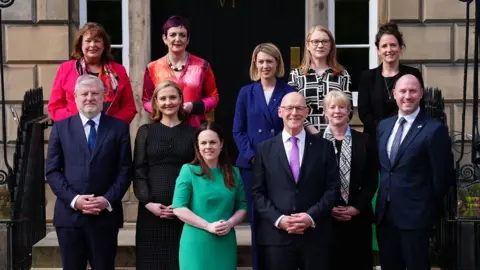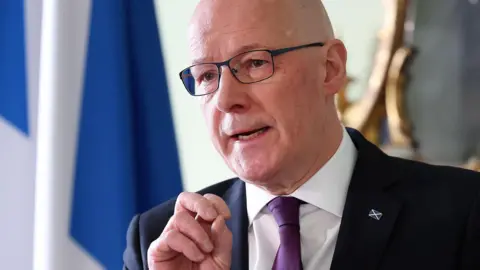Scottish ministers get £19k pay rise as freeze eased
 PA Media
PA MediaScottish ministers are to see their salaries rise by more than £19,000 after the government partially ended a voluntary pay freeze that has lasted 16 years.
The change will mean junior ministers will be paid £100,575 a year while cabinet secretaries will receive £116,125.
First Minister John Swinney would have seen his pay go up to nearly £155,000 but he has declined to take the rise, meaning it will remain at £135,605.
Opposition parties said the increases were not justified by performance and were a "reward for failure".
The voluntary pay freeze for Scottish ministers was introduced under Alex Salmond in 2009 following a global financial crisis and economic downturn.
Ministers' salaries are made up of two elements - their pay as an MSP and a separate ministerial salary reflecting their responsibilities within government.
Since the start of the freeze, they have declined to take their full combined pay entitlement - with about £2.2m of public spending saved as a result since 2009.
The Scottish government said the freeze on the ministerial element would continue, but from 1 April ministers would receive their full MSP entitlement - now set at £74,507 - resulting in an overall rise in the amount they receive.
First Minister and SNP leader John Swinney said his decision was based on the principle of "fairness".
"All members of the Scottish Parliament should be able to take the salary which they are entitled to," he said.
He added: "I've reflected on my own position - so that people don't think I've taken a decision that will benefit me personally - I will leave my salary as an MSP and ministerial frozen."
 PA Media
PA MediaAsked whether the rise at a time when many are facing cost-of-living pressures might fuel an "anti-politics agenda", he said: "The bit I can influence, which is ministerial pay, will remain frozen.
"No other ministerial pay arrangement has been frozen across the United Kingdom for 16 years other than in the Scottish government."
Politicians at Holyrood receive less than those elected at Westminster where an MP will receive £93,904 in the current financial year.
Last year Prime Minister Sir Keir Starmer was entitled to a combined salary of just over £172,000 but chose to receive about £5,000 less.
'Reward for failure'
Opposition parties said the increases could not be justified by the SNP's performance in government.
Scottish Conservative finance spokesman Craig Hoy said: "Nationalist politicians have made a mess of everything they touch – our NHS, education, housing, policing and transport – while stifling the economy, pushing through savage cuts and making Scotland the highest-taxed part of the UK."
Scottish Labour deputy leader Jackie Baillie said "While Scots are struggling, the SNP ministers are being rewarded for their failure.
"As the bill for ministerial salaries rises, Scots will be more frustrated than ever to see services continue to decline on the SNP's watch."
Ministerial and MSP salaries are set and paid for by the Scottish Parliament.
Six serving ministers including cabinet secretaries Mairi Gougeon, Shona Robison and Fiona Hyslop have announced they are standing down from parliament at next year's Holyrood election.
A spokesperson for the Scottish Parliament said the changes would not affect their resettlement payments or pensions because these calculations are based on salary entitlement, rather than what ministers had chosen to receive.
Ministers were also taxed on their salary entitlement rather than the actual amount they received under the voluntary pay freeze, the spokesperson added.
